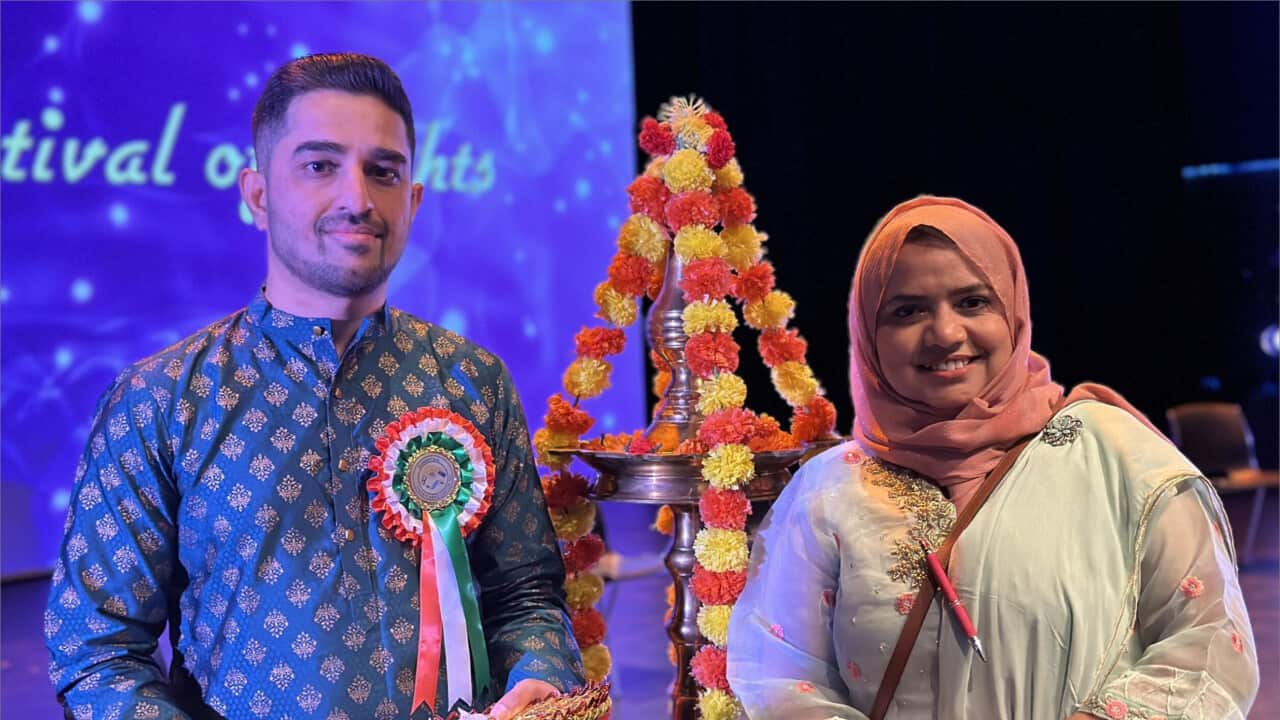Same-sex relationships or identifying as LGBTIQ+ has never been illegal in Nepal, but members of the community do still face discrimination and violence.
Bhumika Shrestha is a trans-rights activist currently working with the Blue Diamond Society, an LGBTIQ+ rights organization in Nepal.
Shrestha identifies herself as third gender (but uses the Nepali equivalent of the pronouns she/her) and was the first Nepali person to travel abroad with their gender listed as “other” on their passport rather than male or female.
“I was born a male, but I never felt I belonged to that body,” she tells SBS Nepali.
“I was very lucky because my family supported me and accepted what I am today.”
Growing up was not easy for Shrestha. Constantly teased by students and singled out by teachers, she was expelled from school after being accused of being a “bad influence” to other students.
“The administration told me to change my behaviour and act like a man or leave school,” Shrestha says.
“The administration told me to change my behaviour and act like a man or leave school."
“It was also difficult walking on the streets.
“The moment people realized I was 'different' they would taunt me and call me derogatory names like 'chakka' and 'hijra'.”
“I remember when I started working with Blue Diamond Society, whenever we invited people for meetings they refused to attend because they thought they would be contaminated with our 'disease' and would turn into homosexuals or third gender.”
Watch Bhumika Shrestha's full interview (in Nepali) below:
Same-sex relationships and those identifying as lesbian, gay, bisexual or transgender have never been criminalized in Nepal . But arrests and violence against the members LGBTIQ+ community are still reported and many still complain about bureaucratic discrimination.
In 2007, Nepal’s Supreme Court to the government to amend laws that discriminate against LGBTIQ+ communities and sexual minorities.
This directive by the highest court of the country had many far-reaching consequences.
Sunil Babu Pant, who founded the Blue Diamond Society, was one of the activists who first took the matter to the Supreme Court.
In 2008, Pant became Nepal’s and Asia’s first openly gay person to get elected into the parliament.
In 2011, Nepal became the first country in the world to add a third gender category in its national census form. It also added the third gender category in the citizenship certificate the same year.
It is one of the few Asian countries to include third gender option in official documents, and is also the to explicitly protect gender and sexual minorities in its constitution.
Shrestha is now also a member of one of Nepal’s main political parties, the Nepali Congress and is also involved in film and fashion industry.
This involvement has helped her spotlight issues faced by the members of the LGBTIQ+ community.
Many members of the community have also made significant contributions towards increased awareness about the issues they face. Anjali Lama, who in 2017 became the first Nepali transgender woman to walk the ramp at a high profile Indian fashion event, has also been campaigning for transgender rights through her volunteer work with the Blue Diamond Society.
Anjali Lama, who in 2017 became the first Nepali transgender woman to walk the ramp at a high profile Indian fashion event, has also been campaigning for transgender rights through her volunteer work with the Blue Diamond Society.

Anjali Lama is a famous ramp model in India. Source: AAP Images/ EPA/DIVYAKANT SOLANKI
Last year, a 40-year-old transgender Nepali woman Monika Shahi also made headlines when she married a 22-year-old man, Ramesh Nath Yogi.
The first of its kind, the wedding was registered in a far western district in Nepal despite the lack of a law regarding transgender couples and same-sex marriage in the country. A government-formed committee has, in the past, looked into the legal recognition of same-sex relationships and in 2015 effectively recommended the legalization of same-sex marriage. But that is yet to progress beyond a recommendation; marriage equality is still under consideration.
A government-formed committee has, in the past, looked into the legal recognition of same-sex relationships and in 2015 effectively recommended the legalization of same-sex marriage. But that is yet to progress beyond a recommendation; marriage equality is still under consideration.

Monika Shahi (left) and Ramesh Nath Yogi (right) made headline after their wedding. Source: RSS
According to advocate Sushma Gautam of Forum for Women, law and development (FWLD), “laws regarding LGBTIQ+ communities in Nepal might be progressive and accepting of same-sex relations but marriage registration act only recognizes marriage between a man and a woman.”
Gautam says that, “the court, marriage and individual incident registration related act along with the domestic violence acts of Nepal have acknowledged de-facto relationships.”
“In the definition, the law has included the concept of living together.”
While news about violence and discrimination against LGBTIQ+ communities continue to be reported from various parts of the world, activists in Nepal report a better situation.
In the past decade, they say, things have started to change, say rights activists.
Bhumika Shrestha says “Discrimination and violence against members of Nepal’s LGBTIQ+ community is still an issue but there is greater acceptance and understanding among the locals.”








